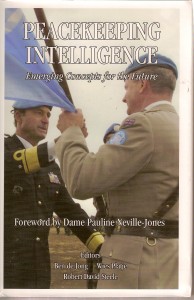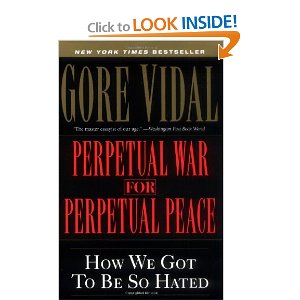New Comment: I am distressed to see so many important books no longer available. Even though it makes my summative reviews valuable as a trace, I have tried to get Amazon to realize that it should offer such books electrionically, micro-cash for micro-text, and Jeff Besoz just doesn't want to hear it. I predict that Kindle will fail.
The author has provided a very informed and well-documented view of the competing “axis of thinking” (unilateralism versus multilateral realism) and “axis of feeling” (isolationism versus engagement). The two together create the matrix upon which a multitude of ideological, special interest, and academic or “objective” constituencies may be plotted.
The endorsement of the book by the Managing Editor of Foreign Affairs is a very subtle but telling indictment of the unilateralist bullying that has characterized American foreign policy since 2000–indeed, the author of the book coins the term “ideological blowback” as part of devastatingly disturbing account of all the things that have been done “in our name” on the basis of either blind faith or neo-conservative presumption.
The book received four stars because at the strategic level, Clyde Prestowitz' book, Rogue Nation: American Unilateralism and the Failure of Good Intentions is better in all ways–easier to read, more detailed, more specifics. Historically, I would bracket this book with the collection of Foreign AffairsThe American Encounter: The United States and the Making of the Modern World Essays from 75 Years of Foreign Affairs articles, , and I would add Wilson's Ghost: Reducing the Risk of Conflict, Killing, and Catastrophe in the 21st Century by McNamara and Blight, Kissinger on Does America Need a Foreign Policy? : Toward a Diplomacy for the 21st Century, Boren et al on Preparing America's Foreign Policy for the 21st Century, and finally Joe Nye's, The Paradox of American Power: Why the World's Only Superpower Can't Go It Alone There are many other books I have reviewed on these pages, and one could make a fine evening of reading only the reviews, as they are summative in nature.
In any event, and the reason I mention other books above instead of in the last paragraph, is to make the point that everyone–other than a few obsessive neo-conservatives who happen to hold the reins of power–is saying the same thing: America must engage the real world, in a multilateral fashion.
The author of this book differs from other authors in that he explicitly recognizes, in his preface and then throughout the book, the fact that a coherent U.S. foreign policy cannot be achieved without the U.S. public's first understanding what is at stake, and then making its voice heard.
The author is also noteworthy in detailing the hypocrisy and ignorance of existing U.S. national security policies. Although Prestowitz does this in a more useful fashion, this book is very valuable and has many gifted turns of phrase. Consider this one, from page 10: “Despite a century of intense global engagement, America is still something of a colossus with an infant's brain, unaware of the havoc its tentative, giant-sized baby steps can cause. We still have some growing up to do as a nation.”
A third aspect of this book that I found compelling was the author's continued emphasis on the need to change mind-sets and emphasize *awareness* over “guts”–as he tells this compelling tale, Americans are too quick to show “toughness” when they perhaps should slow down, orient, observe, decide, and then act on the basis of a fully-informed appraisal of all the linkages and potential consequences of their actions.
A fourth valuable feature of this book is the author's focus on one chapter on American vulnerabilities in the age of globalization and super-empowered angry men. He quotes the incoming Chairman of the Joint Chiefs of Staff, in explaining to Congress the military's incapacity to intervene on 9-11, as saying “We're pretty good if the threat is coming from outside. We're not so good if it's coming from inside.”
This leads to the fifth and final aspect of the book that I found noteworthy: the author's discussion of the mismanagement–even lack of management–of the broad spectrum of the varied instruments of national power. As Suzanne Nossel, a top Holbrook aide puts it, “Today, when it comes to U.S. diplomacy, one hand rarely knows what the other is doing. The U.S. government has no central ledger in which bilateral relationships are tracked. There is no place to turn to find out what the United States has done for a particular country lately, or what a country may want or fear.” The book clearly supports what appears to be an emerging consensus within the Senate that some form of “Goldwater-Nichols Act” for civilian and joint civilian-military national security management.
The endnotes are good, the index useful but annoyingly below 8 font type (possibly as low as 6) which is a very foolish act on the part of the publisher. A readable index would have increased the reference value of this book by at least 10%. The book lacks a bibliography, and here we urge the author to consider one for what we hope will be a second printing: books on realism, books on unilateralism, books on blowback (e.g. The Fifty-Year Wound: How America's Cold War Victory Has Shaped Our World, or Why Do People Hate America?), etcetera.
See also:
The Unconquerable World: Power, Nonviolence, and the Will of the People
A Power Governments Cannot Suppress











